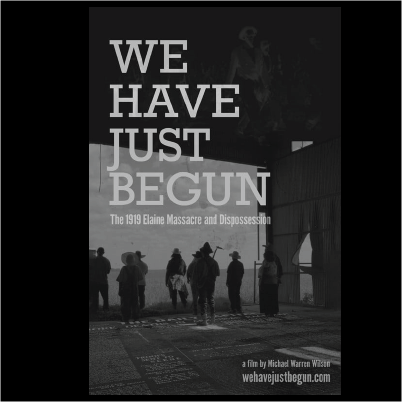In 1919, black workers’ decades-long efforts to challenge exploitation in the Arkansas Delta culminated in the nation’s deadliest racial massacre and labor battle. It’s legacy is deep, despite being hidden for over 100 years.
“We Have Just Begun” takes its name from the secret pass-code used by a Black union of farmers and domestic workers organizing throughout the Arkansas Delta in 1919. A seven-year investigation into the historical events in Phillips County, Arkansas, the film explores the legacy of exploitation, domination, and resistance in the Delta and its ongoing cover up.
False narratives, enduring white supremacy and denial have long clouded the official record of human exploitation in the Arkansas Delta. Ruled by a largely unaccountable class of planters, investors and merchants, violent forms of social control were/are brutally commonplace. Intensified by a nationwide wave of Black empowerment and economic boom during WWI, the US faced revolutionary demands that fundamentally threatened white dominance and ruling class control. Elaine was the culmination of a summer of violent resistance against anti-Black, anti-socialist repression nationwide. “We Have Just Begun” tracks the tradition of Black resistance in the Delta up to today, a continuing site of struggle for labor and social autonomy.
New revelations by descendants, previously-suppressed details, and recordings of eyewitnesses reveal a region plagued by the legacies of massacre, dispossession, Jim Crow laws, and capitalist agriculture. Today, the area and people have even fewer options, yet remain dominated by many of the same historical forces. As the daily physical and structural violence against Black people becomes more broadly visible, the film reveals that same violence to be a traditional form of labor and social control.
Co-written and narrated by acclaimed poet Tongo Eisen-Martin (San Francisco Poet Laureate), and Michelle Duster, who speaks the words of her great-grandmother, Ida B. Wells, the film immerses the viewer in a community wrestling with its own legacy. It reveals previously untold layers of the episode, including buried documents, testimonies and evidence of the actual motivations for the massacre. Through the director’s handmade renderings, the people and landscape of 1919 are evoked in moments that lack any visual record. In addition, the soundtrack features several of the union’s actual songs, performed by Phillips County natives and descendants of the Massacre. A lyrical composition of Delta voices woven through a collaborative effort with the people of Elaine, it is a portrait of rural struggle toward emancipation, despite brutal attempts to suppress it.
Michael Warren Wilson is a filmmaker and artist who was born in Arkansas, graduated from Little Rock Central High and Hendrix College (Conway, Arkansas) without learning about Elaine. Although his great-grandfather was a sharecropper in the Arkansas Delta in 1919, no family stories of the event exist.

